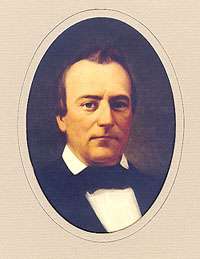Francis Lubbock
Francis Richard Lubbock (October 16, 1815 – June 22, 1905) was the ninth Governor of Texas and was in office during the American Civil War. He was the brother of Thomas Saltus Lubbock, for whom Lubbock County, Texas, and the City of Lubbock are named.[1]
Francis Lubbock | |
|---|---|
 | |
| 9th Governor of Texas | |
| In office November 7, 1861 – November 5, 1863 | |
| Lieutenant | John McClannahan Crockett |
| Preceded by | Edward Clark |
| Succeeded by | Pendleton Murrah |
| 6th Lieutenant Governor of Texas | |
| In office 1857–1859 | |
| Governor | Hardin R. Runnels |
| Preceded by | Hardin R. Runnels |
| Succeeded by | Edward Clark |
| Personal details | |
| Born | October 16, 1815 Beaufort, South Carolina |
| Died | June 22, 1905 (aged 89) Austin, Texas |
| Political party | Democratic |
| Profession | Politician |
Born in Beaufort, South Carolina, Lubbock was a businessman in South Carolina before moving to Texas in 1836. During the Republic of Texas period, President Sam Houston appointed Lubbock to be comptroller.[2][3]
In 1857, Lubbock was elected lieutenant governor of Texas as a Democrat, but failed in his re-election bid in 1859. Following the Confederate secession in 1861, Lubbock won the governorship of Texas. During his tenure, he supported Confederate conscription, working to draft all able-bodied men, including resident aliens, into the Confederate States Army. He was known to praise the Great Hanging at Gainesville, where in October 1862, some 42 suspected Unionists were murdered, convicted and killed by hanging through sentences by a "Citizens Court" organized by Texas state troops, but not recognized under state law, with some 14 lynched without benefit even of a show trial.[4] It was part of an outbreak of violence, often caused by Confederate or state troops, in North Texas in the early years of the war.[5]
When Lubbock's term ended in 1863, he joined the Confederate Army. He was commissioned as a lieutenant colonel, serving under Major General John B. Magruder. By 1864, Lubbock was promoted to aide-de-camp for Jefferson Davis. Following the Confederacy's military collapse, Lubbock fled from Richmond, Virginia, with Davis. They were soon caught by Union troops in Georgia. He was imprisoned at Fort Delaware with John Reagan and Jefferson Davis for eight months before being paroled.
On his return to Texas, Lubbock continued to pursue business interests in Houston and Galveston. From 1878 to 1891, he served as Texas State Treasurer. He died in Austin.
References
- John Everett-Heath (September 13, 2018). The Concise Dictionary of World Place-Names. Oxford University Press. p. 1075. ISBN 978-0-19-256243-2.
- Sam Houston; Eugene Campbell Barker (1939). The Writings of Sam Houston, 1813-1863. The University of Texas press. p. 308.
- Paul G. Pierpaoli Jr. (March 24, 2015). Spencer C. Tucker; Paul G. Pierpaoli Jr. (eds.). American Civil War: A State-by-State Encyclopedia [2 volumes] A State-by-State Encyclopedia. 2. ABC-CLIO. p. 769. ISBN 978-1-59884-529-7.
- McCaslin, Richard B. "Great Hanging of Texas". Handbook of Texas Online. Texas State Historical Association. Retrieved August 11, 2013.
- Andrew Himes (April 14, 2011). The Sword of the Lord: The Roots of Fundamentalism in an American Family. Chiara Press. p. 77. ISBN 978-1-4538-4375-8.
External links
- Francis Richard Lubbock from the Handbook of Texas Online
- Read an entry about Francis R. Lubbock from the Biographical Encyclopedia of Texas published 1880, hosted by the Portal to Texas History.
- Sketch of Lubbock from A pictorial history of Texas, from the earliest visits of European adventurers, to A.D. 1879, hosted by the Portal to Texas History.
| Political offices | ||
|---|---|---|
| Preceded by Hardin Richard Runnels |
Lieutenant Governor of Texas 1857–1859 |
Succeeded by Edward Clark |
| Preceded by Edward Clark |
Governor of Texas 1861–1863 |
Succeeded by Pendleton Murrah |

